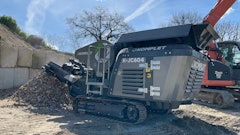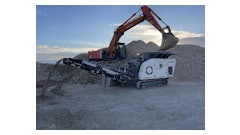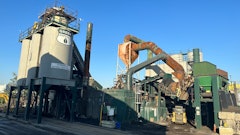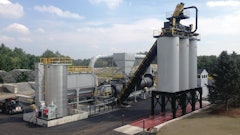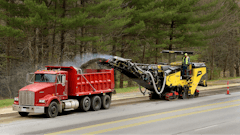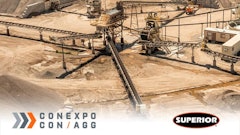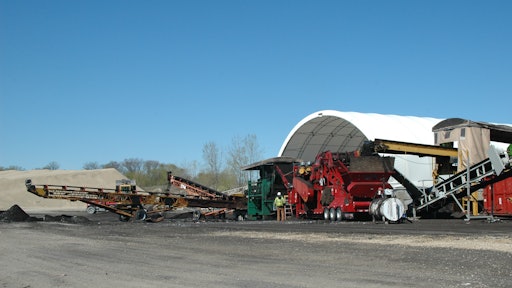
According to the Environmental Protection Agency, over 11 million tons of recyclable asphalt shingles end up in landfills every year in the United States alone. Those 11 million tons amount to over 8% of the nation’s total building-related waste. The asphalt industry, ever a champion of recycling, has been trying to reduce the environmental impact of shingles by grinding them up and putting them back into our roads instead of in landfills, making both environmental and economic sense.
In 2014, over 2 million tons of Recycled Asphalt Shingles (RAS) were put to use in new pavements in the United States, saving taxpayers more than $2.8 billion. Wolf Paving, based in Oconomowoc, WI, is one contractor helping the industry contribute to those savings.
The company, who completes paving and engineering services, sweeping, crack filling and sealing, soil and materials testing, and supplies asphalt/aggregate for south eastern Wisconsin, partnered with Badger Materials Recycling, LLC in 2010 to start taking advantage of the boom in recycled materials.
For six years, Wolf Paving has been partnering with Badger Materials and they have recycled over 85,000 tons of shingles to put back into their mix designs, saving them money and making their company more sustainable.
Adding Shingle Grinding Services
Wolf Paving has two asphalt plants, one in Oconomowoc and another in Sun Prairie, WI. Since the company produces asphalt for projects that range from driveways to WISDOT highways, the company knew they needed to find an alternative source of oil for their mixes.
“RAS is a green product, as well as recycling a product that was going to the landfill, it can reduce costs and strengthen the new asphalt being produced,” Sean Wolf, Vice President of Wolf Paving says. “It’s all about recoverable oil. Through the shingles we receive and process, there’s about 25% recoverable oil in them. That’s what makes it economical.”
Wolf Paving receives shingles from independent roofing companies as well as roll-off dumpster companies from all over the tri-state area. Contractors bring the shingles to Wolf Paving and pay them a nominal fee for the recycling. Even with transport costs, contractors will bring their shingles to Wolf Paving and pay less than they would to dispose of them at a landfill.
When the shingles are ready to be processed, they are first fed to a handler.
“Every shingle is hand touched,” Michael Ettner with Badger Materials says. “We are heavily involved with the sorting in order to remove contaminants (like plastic and wood) and ensure a good quality material is produced.”
Once sorted, the materials are processed through a RG-1 Rotochopper Shingle Grinder. The processed material has nails removed by a magnetic conveyor and oversized materials are sent to another conveyor to be re-processed.
Wolf Paving processes the shingles to 3/8-in. and stores them under cover to maintain consistency and keep moisture out until it’s ready to be added into a mix design. Wolf Paving also supplies their RAP to several other asphalt producers in the state of Wisconsin.
In addition to recycling shingles, Wolf Paving recycles concrete, metal, plastic and even wood. They recently purchased a B-66 SP Rotochopper grinder that can accept both shingles and wood for increased recycling and profit opportunities.
“Contractors who bring us shingles will most likely already have wood from pallets, and the shingles also have wood debris on them, so this type of grinder made sense for us to buy,” Wolf says. “Now, we’re accepting other wood building materials from contractors to recycle.”
The wood materials are ground up and used as mulch and even bedding for horses. Wolf Paving is able to charge contractors a minimal fee that covers their sorting and cleaning costs, one that would be less than disposing of the materials at a landfill, and then make a profit from the materials once they are recycled.
“We see waste as opportunities for growth,” Ettner says. “Recycling saves resources and creates jobs, it’s a win-win.”
Plant Upgrades
Almost all of the mixes Wolf Paving produces contain some percentage of RAS. Throughout the course of the year, Wolf estimates that about 3% of every mix design produced will have some RAS in it.
When Wolf Paving initially purchased their Oconomowoc plant, it was set up to be portable. Over time, they have made improvements and purchases to the Dillman plant that now sits on just a portion of the 400 acres of land at that location.
One purchase made was a newer plant collar. These collars allow for the recycled materials to be added into the back of the mixing drum so the materials are not dried out.
“Adding the recycled product after drying the aggregates keeps from burning off any residual oil in the RAS,” Wolf says. “This also saves on fuel and drying costs.”
Over the winter, Wolf Paving invested in a new control house for their Oconomowoc location.
The control house features an upgraded MCC (motor control center) to, allow all of the electrical to be safely in one room. A point and click motor starting program was installed to eliminate all of the manual starter buttons and unnecessary wiring. "This makes it easier to operate and diagnose issues as they arise," says Wolf Paving quality manager Mark Sweeting. Wolf also raised the control house up by 12 feet which greatly increases what the plant operators can see a full 360° around the plant.
“We’re constantly looking for new ways to incorporate recycled materials into our asphalt that can help the environment, that we can divert from landfills and that can make our asphalt better.” Wolf says. “We’re always looking for new technologies/processes to improve our industry and we’re doing that through recycled materials and upgrades to our equipment and asphalt production facilities.”






